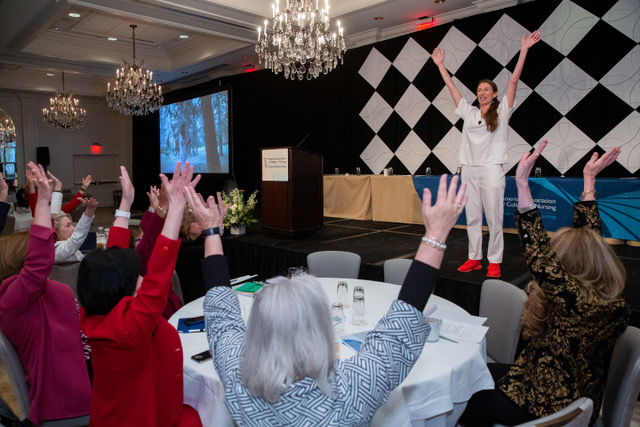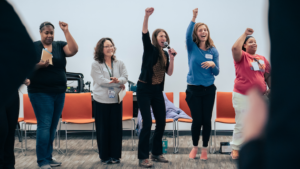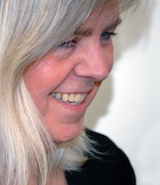
Vol. 22, Issue 4, May 7, 2024
“I want every nurse to feel how important they are and that comes from not only giving care but learning to receive it as well.”
That’s what nurse speaker Tara Rynders, RN, MFA, BSN, BA, told me in my recent interview with her, and that message feels like the perfect message for celebrating nurses during Nurses Week recognition this month.
You see, there was a time during her nursing career that Tara couldn’t feel anything, let alone feel cared for or appreciated. She was just numb, burned out. And it was her own experience as a patient that revealed to her the important role that nurses can play for each patient and for each other as well.
Tara Rynders
Softening Into Spaces of Care
Plugging away in the ER, where she spent most of her 25-year career, Tara was feeling burned out. However, she told me in our interview, she didn’t even know she was burned out because there was no language for it at the time.
She recalls a day when they were slammed in the ER, and she was on her third 12-hour shift in a row.
“We were on divert because all of our beds were full,” she said. “The ER was full; the hallways were full. I was exhausted. There was no reprieve in sight, and a patient walked in through the front door sent by her doctor for an ectopic pregnancy.
“This patient was very angry. I was trying to start an IV, and she yelled at me like, ‘What are you doing? I don’t want an IV.’
“And I just lost it. I threw my IV supplies on the table, and I said, I am just trying to help you — I think I said it a little bit angrier than that. I walked out of the room, and I remember going to my charge nurse and saying, ‘I’m not taking care of that patient.’
“I did stay and finish my shift, but it was a turning point for me. I was realizing that I needed to do something different. Then, shortly after that, I ended up having my own ectopic pregnancy.”
This time Tara was the patient.
“I remember my nurse and the fear in her eyes when she called a code yellow because I had passed out from internal bleeding,” Tara recalled. “Everyone came running into the room and I could hear everything, but I couldn’t speak. Amidst all of that chaos, my nurse grabbed my hand and said simply, ‘I’m here and you’re going to be okay.’”
“Suddenly I realized – wow! – that nurse is taking care of me. I relaxed and grew aware that receiving her care felt really great.
“Those are the moments that nurses have on a daily basis, moments that offer an opportunity to care for people. I don’t think nurses realize how impactful they are and how they can change lives just by leaning into those tough moments for people.”

That’s when Tara went on this new mission.
She realized, as she thought further about it, that if nurses – or anyone for that matter – are to care for patients, they must first care for themselves. They must realize their own importance and respect the team working with them. And they must lose the fear and isolation that many feel and that arise in workplaces where everyone is inclined to feel self-sufficient and resilient.
“I want every nurse to know how important they are. I want every nurse to feel cared for so that they can continue to do what that nurse did for me.
“I think that nurses have a hard time letting ourselves be cared for because we’re constantly caring for other people. We think that’s our identity. Our ‘worth’ is wrapped up in that as well. But if we all learn to care for ourselves and those around us, we can avoid feeling burned out – and even thrive in our jobs.”
Healthcare – Humans Caring for One Another
Tara began researching the barriers that prevented nurses from being able to take care of themselves, and that was about the time that the term “burnout” began showing up in everyday descriptions of stressful jobs – such as nursing.
“Caring for patients presents a double-edged sword,” she said. “There’s both the joy that comes from nursing and caring for our patients and the grief that can also grip us and steal some of that joy.
“Once we started to have the language around nurses’ grief and burnout, then I felt it was important to support nurses, so that’s when I started creating my keynotes and workshops.
“I think the heart of what I help people remember is that what’s going to help us with burnout and help us with all these issues that we’re facing as whole healthcare systems as well as healthcare humans is our ability to care for one another.
“It seems simple, and yet there is a problem: the systems that we have in place are not set up for us to care for ourselves or to care for each other as colleagues, and that robs us of the ability to take care of patients the way that nurse took care of me.
“In my keynotes I help systems and people in really tangible ways so that they can start creating systems of care on their own.

In her keynote, she creates interactive moments that enable attendees to experience care amongst each other during the program, moments that reveal how important that mutual care is.
“When they go back to work, they’re able to implement these new ways of caring for each other and for themselves by integrating them right into their systems — into huddles, for example, into staff meetings, and into shared governance – and all those spaces already exist.
“My listeners return to work ready to infuse different structures so that when they start a meeting, for example, the first thing they can do is say, ‘Give somebody a high five or a hug, and say it’s so good to see you. I’m so glad you’re here.’”
Softening into Spaces of Care – Where the Magic Happens
As we talked further, Tara harkened back to her ectopic pregnancy experience in the ER when she was passed out and the nurse was trying to care for her. She said she had been in her stalwart, “I got this, I’m strong, I don’t need you.” mode, because that’s what she’d been taught.
“We’ve been taught that being resilient means to push through, keep going,” she said. “The reality is that the moment that I softened into my nurse’s hand, and I let her care for me is the moment that I was basically honest with myself about what I needed, and I allowed someone to meet that need.
“That’s where the magic happens. And now I want to do all of this for other nurses because now I know what it feels like to be cared for, and I want everyone to feel this way.
“So resiliency is actually not about hardening oneself. It’s really about softening into spaces of care, whether it’s caring for ourselves or others or letting somebody else care for us. I think that it’s also really important to rewire our brains into what resiliency can really look like. I actually created a new word for it; I call it ‘re-brilliancy.’
“I think we have such a hard time with the word resiliency because it’s been so ingrained in us that the onus is on us — we must stay strong, we can do it. When really, it’s a communal act and re-brilliancy requires someone else reflecting back and helping you remember the brilliant and resilient human you already are.
“It’s actually kind of innate in us. We are resilient. We woke up this morning. We are resilient beings. But what we need sometimes is another person to come along and care for us and shine a light on all the beauty and the resilience that’s within us and to help us through that moment.
“Another lovely quote that I like to use in my keynotes and share is from bell hooks, and that is that rarely do we ever heal in isolation. It’s when we commune with one another in relationship that healing takes place.”
While Tara talks about these ideas in her keynotes, the real magic happens in the exercises she leads during the sessions, in which nurses experience giving and receiving care from one another in real time.
At the end of the day, her keynote and the workshop are for people looking to reignite their joy and re-establish their love of nursing by caring for themselves and their colleagues. And that ultimately benefits the patients as well, because they show up so much more connected and cared for.
Tara could have exactly the right message for your nursing staff, and if she does, her appearance at a program could ignite significant improvements for the entire organization.
To learn more about Tara and how to bring her message and talents to your nurses, drop me an email at barbara@speakwellbeing.com or give me a call at 503-699-5031.
There’s More . . . To Come
There’s another aspect to Tara’s work that really ignites the joy in her as well as the joy in others, and that is dance.
If you read her profile on my website, you’ll notice that in 2011 she received her Master’s in Fine Arts in Dance and Somatic Practices from The University of Colorado at Boulder.
There’s a story behind that, and the enrichment it offers to nursing and the lives of nurses. I’ll share that in our next issue.
Until next time, take care of yourself, for your well being and those you love.
Barbara

For Your Well Being is published with the intention of bringing you insider speaker reports, exclusive stories about special events around the country, meeting planner tips, and fun stuff from the worlds of health and well being. Be well and be in the know!
The Speak Well Being Group is a specialized speakers bureau, focusing on health and wellness for all types of organizations that want to foster health and well being for their employees, members, clients, and in their communities.
Our speakers are hand-selected. They are not only experts in their fields; they connect with their audiences while bringing them life-changing information, smiles of recognition, and ultimately a sense of well being and hope.
Finding the perfect keynote speaker for your special event or conference is my personal passion, not just once, but year after year. It brings me great joy to know that your audience was delighted and moved by the speaker we selected together. I’m committed to making the process easy, pleasant and fun.
